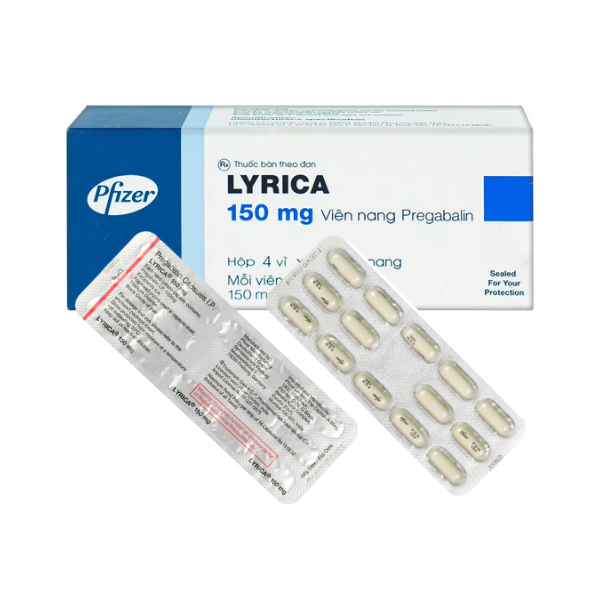How Lyrica 150 mg Helps Manage Chronic Neuropathic Pain
Chronic neuropathic pain can significantly impact a person’s quality of life, making even simple daily activities difficult. Fortunately, medications like Lyrica 150 mg (Pregabalin) provide effective relief by targeting the underlying mechanisms of nerve pain. This article explores how Lyrica 150mg works, its benefits, dosage guidelines, potential side effects, and important precautions.
Understanding Neuropathic Pain
Neuropathic pain arises from damaged or dysfunctional nerves, often causing burning, shooting, or stabbing sensations. Common conditions associated with neuropathic pain include:
- Diabetic neuropathy (nerve damage due to diabetes)
- Postherpetic neuralgia (pain after shingles)
- Spinal cord injuries
- Fibromyalgia
- Peripheral nerve injuries
Unlike typical pain caused by inflammation or injury, neuropathic pain responds poorly to standard painkillers like ibuprofen or acetaminophen. Instead, medications like Pregabalin (Lyrica) specifically target nerve signaling to provide relief.
How Lyrica 150 mg Works
Lyrica 150 mg contains Pregabalin, an anticonvulsant and nerve pain medication. It works by:
- Binding to Calcium Channels – Pregabalin attaches to specific calcium channels in the central nervous system (CNS), reducing the release of pain-signaling neurotransmitters like glutamate, noradrenaline, and substance P.
- Calming Overactive Nerves – By modulating nerve activity, Lyrica helps prevent excessive pain signals from reaching the brain.
- Reducing Seizures & Anxiety – Besides pain relief, Pregabalin also helps control seizures in epilepsy and eases anxiety disorders by stabilizing electrical activity in the brain.
Benefits of Lyrica 150 mg for Neuropathic Pain
Clinical studies and patient reports highlight several benefits of Lyrica Pregabalin:
✔ Effective Pain Relief – Many patients experience significant pain reduction within the first week of treatment.
✔ Improved Sleep – Chronic pain often disrupts sleep, but Lyrica helps by reducing nighttime discomfort.
✔ Enhanced Quality of Life – With better pain control, patients can resume daily activities more comfortably.
✔ Versatile Treatment – Besides neuropathy, Lyrica is prescribed for fibromyalgia, generalized anxiety disorder (GAD), and partial-onset seizures.
Dosage & Administration
- Starting Dose: Doctors typically prescribe 75 mg twice daily before increasing to 150 mg twice daily for optimal effect.
- Maximum Dose: Up to 300 mg twice daily (600 mg total) for severe cases, but higher doses increase side effect risks.
- Formulations: Available as immediate-release capsules (Lyrica) or extended-release tablets (Lyrica CR).
- Administration: Take with or without food, but consistency (same time daily) improves effectiveness.
Note: Do not stop Lyrica suddenly—taper off gradually to avoid withdrawal symptoms like insomnia, nausea, or headaches.
Possible Side Effects
While Lyrica 150mg is generally well-tolerated, some users may experience:
Common Side Effects
- Dizziness
- Drowsiness
- Dry mouth
- Blurred vision
- Weight gain
- Swelling in hands/feet (edema)
Serious Side Effects (Seek Medical Help)
- Severe allergic reactions (rash, swelling, difficulty breathing)
- Mood changes (depression, suicidal thoughts)
- Muscle pain, weakness, or dark urine (signs of muscle breakdown)
- Vision changes or eye pain
Precautions & Interactions
Before taking Lyrica 150 mg, discuss the following with your doctor:
- Pregnancy & Breastfeeding – Pregabalin may harm the fetus; avoid unless absolutely necessary.
- Kidney Problems – Dose adjustments are needed for patients with kidney impairment.
- Alcohol & Sedatives increase drowsiness and dizziness.
- Diabetes – May cause swelling or weight gain, affecting blood sugar control.
Drug Interactions
Lyrica can interact with:
- Opioids (morphine, oxycodone) – Increases risk of severe drowsiness and respiratory depression.
- Benzodiazepines (lorazepam, diazepam) – Enhances sedative effects.
- ACE inhibitors (lisinopril) – These may worsen swelling.
Always inform your doctor about all medications, supplements, or herbal products you take.
Lifestyle Tips for Managing Neuropathic Pain
Combining Lyrica 150mg with lifestyle changes can enhance pain relief:
✅ Follow a Balanced Diet – Reduce sugar and processed foods to lower inflammation.
✅ Exercise regularly – Gentle activities like walking, yoga, or swimming improve circulation and nerve function.
✅ Manage Stress – Meditation, deep breathing, or therapy can reduce pain perception.
✅ Avoid Alcohol & Smoking – Both worsen nerve damage and pain.
Conclusion
Lyrica 150 mg (Pregabalin) is a proven treatment for chronic neuropathic pain, offering relief by calming overactive nerve signals. While it effectively reduces discomfort, patients should follow their doctor’s dosage instructions and monitor for side effects. When combined with healthy lifestyle habits, Lyrica can significantly improve daily functioning and overall well-being.


